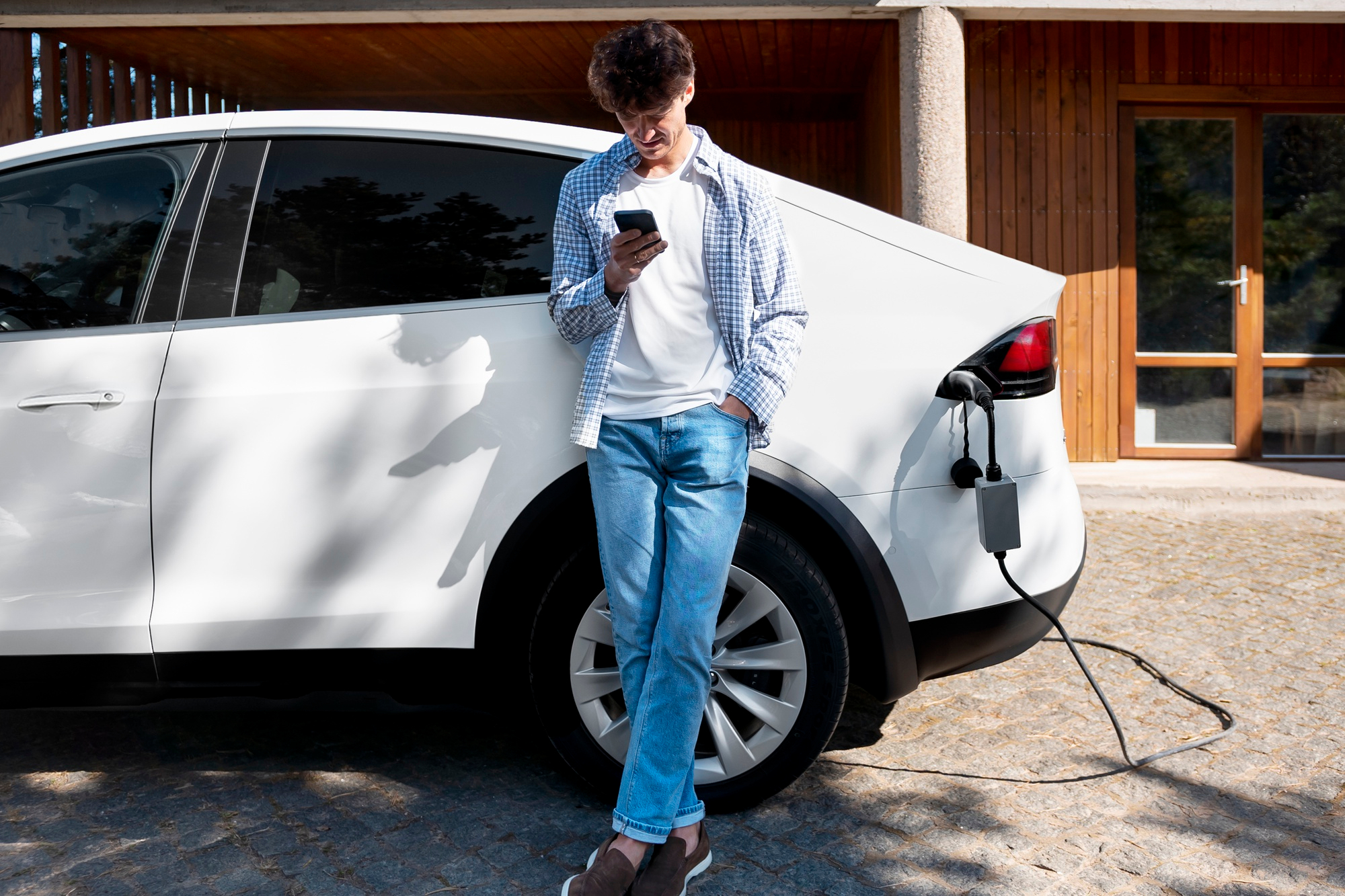THE FUTURE OF EV CHARGING
THE FUTURE OF EV CHARGING
FREE EV CHARGING HELP CENTRE BY VCHRGD
THE RISE OF ELECTRIC VEHICLES AND EV INFRASTRUCTURE

The transportation industry is undergoing a significant transformation, with the rise of electric vehicles (EVs) leading the way. According to the International Energy Agency, the number of EVs on the road is expected to reach 125 million by 2030, up from just 3 million in 2017. This growth is driven by several factors, including government incentives, lower battery costs, and increased consumer awareness of the environmental benefits of EVs.
However, the widespread adoption of EVs is dependent on the availability of a robust charging infrastructure. EV charging infrastructure refers to the network of charging stations that allow EV owners to recharge their vehicles. Without a reliable and accessible charging infrastructure, EVs will not be able to replace traditional gasoline-powered vehicles.

Understanding the Different Types of EV Charging Stations and How They Work

There are three main types of EV charging stations: Level 1, Level 2, and DC fast charging. Level 1 charging uses a standard 120-volt household outlet and can take up to 20 hours to fully charge an EV. Level 2 charging uses a 240-volt outlet and can charge an EV in 4-8 hours. DC fast charging, also known as Level 3 charging, uses a high-powered charging station and can charge an EV in as little as 30 minutes.
The Benefits of EV Charging for Individuals, Businesses, and the Environment
EV charging offers several benefits for individuals, businesses, and the environment. For individuals, EV charging provides a convenient and cost-effective way to recharge their vehicles. EV owners can charge their vehicles at home, work, or public charging stations, reducing the need for frequent trips to the gas station.
For businesses, EV charging can attract customers and employees who drive EVs. Installing EV charging stations can also help businesses meet sustainability goals and reduce their carbon footprint.
From an environmental perspective, EV charging can significantly reduce greenhouse gas emissions. According to the Union of Concerned Scientists, EVs produce 60% less carbon dioxide emissions than gasoline-powered vehicles, even when accounting for the emissions from electricity generation.


EV charging is a critical component of the transition to a more sustainable transportation system. As the number of EVs on the road continues to grow, it is essential to invest in a robust charging infrastructure that can meet the needs of EV owners. By understanding the different types of charging stations, the benefits of EV charging, and the challenges that need to be addressed, we can ensure a smooth transition to a cleaner and more efficient transportation system.

F E A T U R E S
TETHERED OR SOCKETED
5m Cable & Type 2 Connector with integrated holster & cable wrap around, or with universal type 2 socket
EASY APP CONTROL
Free to use app, to schedule, lock/unlock, monitor cost & usage, check charge status & much more.
EASY TO INSTALL
Intuitive design with simple bracket mount. VCHRGD approved installers are available locally.
SECURE
Rigorously tested, contactor-based solution. Optimised thermal performance & backed by our 3 year warranty
CONNECTED
Communicates via WiFi and Bluetooth to your home router and mobile app. *NFC tap to charge optional
PEN PROTECTION
No additional earthing rod required for installation. RCD Type A leakage detection & welding detection
SOLAR COMPATIBLE
Configurable for solar charging, using your energy, your way *CT clamp provided as standard
UK BASED SUPPORT
Local support contacts and all firmware and software upgrades seamlessly run OTA, no extra hassle for you
SMART HOME COMPATIBLE
Dynamic load management to protect your home & appliances *CT clamp provided as standard

Get A Quote Quickly And Easily

FAQ
It is highly recommended that EV drivers have a home charger, this is mainly due to cost savings per charge and convenience. Of course, it’s not a one size fits all solution and it’s important to consider there are lots of factors to consider, like cost & access to public charge points.
If you don’t want to have a fully installed 7kW home charging solution, then you can always buy a 3.6kW portable charger, that plugs into your mains socket.
The VCHRGD seven comes in 2 options, Tethered or Untethered. The tethered version with the cable and connector built-in, will only work with electric vehicles that charge with a Type 2 connector, this is the most common European standard connector. The Untethered version, comes with a Type 2 socket, this is a universal solution, as there will always be a cable that connectors your car to a Type 2 socket, whether it’s Type 1 or Type 2. If you’re in doubt about the connector type your vehicle uses, you can always check with the car manufacturer.
A 7kW home charger offers a maximum of 7KW of charge per hour, on average this is 25 miles of range per hour (depending on conditions). To calculate how long it will take to charge your car, you take the total battery capacity of the vehicle and divide it by the charger power. For example, if my car has a 60kWH battery, and my home charger is 7kW, then 60kWH/7kW= 8.5 hours to fully charge.
The best time for you to charge is when you most need it! But this won’t always be the cheapest time, if you’re not in a hurry then it’s best to program your on and off-peak electricity tariff into the vchrgd app, and set your charge times. This way the vchrgd seven will boost your charge when electricity is cheapest. If you generate power for your home via a solar panel, then you can use renewable energy to power your car when it’s available, at no cost to you.
every day in the UK there are more and more public charge points coming online, on motorways, gyms, hotels, restaurants, car dealerships and everywhere in between. For more info. On public charge points near you, check out https://www.zap-map.com/live/
Yes there is! The EV Chargepoing Grant is a grant that provides funding of up to 75% towards the cost of installing electric vehicle smart chargepoints at domestic properties across the UK.
It replaced the Electric Vehicle Homecharge Scheme (EVHS) on 1 April 2022. The EV chargepoint grant for flat owner-occupiers and people living in rented properties is for anyone who: Owns and lives in a flat Rents any residential property The grant covers up to 75% of the cost to buy and install a chargepoint socket, up to £350 per grant. Your installer will claim the grant on your behalf.
The Office for Zero Emission Vehicles (OZEV) provides this grant. For more information on the EV Chargepoint Grant check out https://www.gov.uk/government/collections/government-grants-for-low-emission-vehicles#ev-chargepoint-grant.
This all depends on the complexity of your installation, it can take anywhere from an hour to 3 hours. To get the best idea of installation time, fill out our site survey to get a quote, and then speak with your chosen installer to get the best idea of how long your installation will take.
We currently offer a 7kW tethered and untethered charger, perfect for SME's and destination charging.
We will be launching out 11 -22kW charging range in early 2023, so if you have a project you'd like to discuss then please give us a call.
The best chargers for your business are those that offer the best combination of cost, convenience and charging speed. Wheras most homes are limited to a 7kW charger due to single phase power supplies, many businesses have 3 phase power.
This enables you to charge at faster speeds of 11kW, 22kW or oven more.
Utilising the governe=ment grant scheme to offset the cost of infrastructure is also a key factor.
So by selecting chargepoints that are registered with the OZEV Workplace Charge Scheme is important.
To find out what the best fit charging solutions are for your business, give us a call and our friendly and helpful sales team will guide you through selection.
Yes there is! The Workplace Charging Scheme (WCS) is a voucher-based scheme that provides eligible applicants with support towards the upfront costs of the purchase and installation of electric vehicle (EV) charge points. The WCS is open to businesses, charities and public sector organisations that meet the applicant and site eligibility criteria.
The grant covers up to 75% of the total costs of the purchase and installation of EV charge points (inclusive of VAT), capped at a maximum of:
£350 per socket
40 sockets across all sites per applicant – for instance, if you would like to install them in 40 sites, you will have 1 socket available per site.
For more information on the Workplace Charge Scheme grant check out: https://www.gov.uk/guidance/workplace-charging-scheme-guidance-for-applicants
It is available in England, Wales, Scotland and Northern Ireland, but not in the Channel Islands or Isle of Man.
The scheme is run by the Office for Zero Emission Vehicles (OZEV) and administered by the Driver and Vehicle Licensing Agency (DVLA).

VCHRGD Technologies
Unit 1a, Eghams Court
Boston Drive, Bourne End
SL8 5YS

BUILT FOR THE UK MARKET
©2023 VCHRGD TECHNOLOGIES

VCHRGD Technologies
Unit 1a, Eghams Court
Boston Drive, Bourne End
SL8 5YS

BUILT FOR THE UK MARKET
©2023 VCHRGD TECHNOLOGIES


